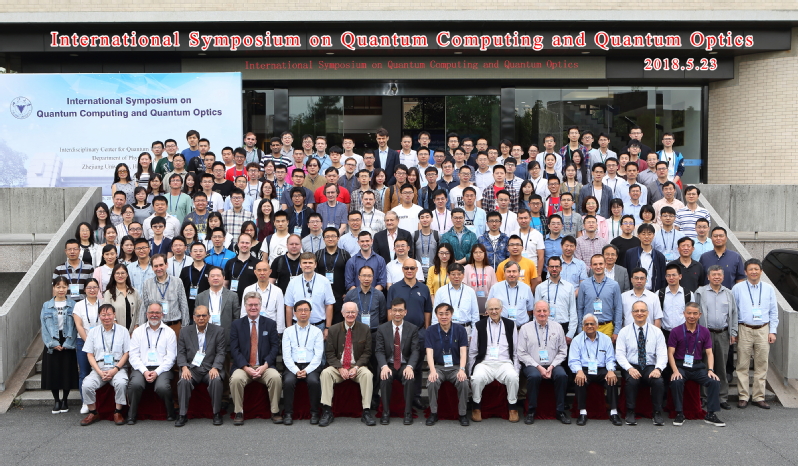Editor: Becky Time: 2018-05-27 Number of visits: 105
Continuing on the traditions set by the previous two West Lake Symposiums, Zhejiang University’s Department of Physics and Interdisciplinary Center for Quantum Information held the International Symposium on Quantum Computing and Quantum Optics at Yuquan Campus’s Shao Ke Hall on May 22nd to the 25th, 2018. In total, the symposium was attended by more than 170 academics, with lectures given by 37 world renowned scholars, including Jianwei Pan, Xincheng Xie, and Shiyao Zhu of the Chinese Academy of Sciences, Marlan Scully of the US National Academy of Sciences, Joseph Eberly the former President of The Optical Society of America, Wolfgang Schleich of the German Academy of Sciences, Girish Agarwal of the British Royal Society, Chief Scientist John Martinis of Google’s Quantum Computing Laboratory, and Chief Scientist Franco Nori of the Japanese Institute of Physical and Chemical Research (RIKEN). Zhejiang University’s Vice President, Dr. Jianhua Yan, gave the opening remarks.
At the symposium, the participating academics and researchers from the international quantum optics and quantum computing communities engaged in stimulating and thought-provoking dialogue about recent discoveries in their fields. During the duration of the symposium, the participants discussed important topics about many newly discovered quantum phenomena, debated about what kinds of physical systems are required to realize a fully-functioning quantum computer, and put forth key questions about the technological challenges needed to be overcome in quantum optics and quantum computing. The main topics of the symposium comprised of manipulation methods on single quantum bits, quantum acceleration algorithms, many-body physics, chirality phenomena in quantum optics, manipulation by superconducting quantum bit entanglement, topological quantum computing, containment and control of ultracold atoms and ions, integration and decoherence in quantum computing, and much more. At the same time, the researchers engaged in more philosophical debate surrounding quantum mechanics and quantum technology, noting that developments in these fields will not only help humanity better understand the quantum world, but will provide the creative answers and solutions to challenges that humanity will no doubt face in the future.
During the symposium, Prof. Marlan Scully of the US National Academy of Sciences reported on using a quantum optic approach to explain the entropy of black holes and gave forth a new perspective on the origins of quantum gravity. Chief Scientist of Google’s Quantum Computing Laboratory, Prof. John Martinis, introduced the layout of Google’s superconducting quantum computers and emphasized that both the amount and quality of quantum bits are equally important for realizing a true working quantum computer. While professors of Zhejiang University’s Department of Physics, including Prof. Jianqiang You, Prof. Dawei Wang, and Prof. Haohua Wang, each introduced and discussed their own research. Their reports represented the research progress made by Zhejiang University’s quantum information experiments on superconducting circuits and “hot” atoms. The researchers argued that many-qbit superconducting circuits and “hot” atom systems could serve as a platform to run simulation experiments in order to investigate problems in many-body quantum physics.
The International Symposium on Quantum Computing and Quantum Optics served as an important event celebrating the 90th anniversary of Zhejiang University’s Department of Physics. This year’s symposium was organized by the Interdisciplinary Center for Quantum Information, directed by Prof. Zhu-an Xu and whose Chief Scientist is Dr. Shiyao Zhu. We are pleased that the symposium served as an event for international experts in quantum fields and young scholars to interact and engage in critical dialogue about current research. This interaction allowed students at Zhejiang University to connect with world experts, understand trends in the frontiers of research, and widened their view of academia.


Add: No. 8 Hainayuan Building, Zijingang Campus, Zhejiang University, 866 Yuhangtang Rd, Hangzhou, 310027, P.R. China
Tel: +86-571-87953325
Fax: +86-571-87951895
Email: yongyi@zju.edu.cn